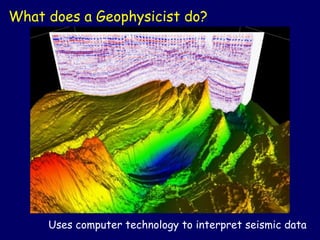All Categories
Featured
Table of Contents
Geophysics Jobs in Yanchep Aus 2020
This work is progressively contracted out, so consultancies provide another source of employment. Consultancy firms vary in size, from extremely little companies to large multinationals. Some consultancies are quite specialised in utilizing particular geophysical strategies or working in particular locations, while others provide a more diverse variety of services to their clients.
The extraction of gas from land fill websites is another location of work and this may grow in the future. Expedition companies might undertake work for building firms, public utility, mining companies and environmental firms, so geophysicists might be utilized in any of these settings. Other companies consist of: geological surveysgovernment bodies and agenciesuniversities and research institutes.


Vacancies may be listed in the oil and gas sector press. Recruitment is affected by oil cost fluctuations and the level of competitors for positions differs depending upon this. Careers Days, which cover the complete series of geoscience professions and are typically attended by a number of key market employers, are run by The Geological Society.
Geophysical Survey in Kiara Aus 2023
Some of the big oil and gas business offer a full two-year structured training programme across the breadth of geophysics, including the opportunity to experience work in different teams prior to specialising in one area. Your training may include work on: existing wellsmagnetic and gravitational potential field information analysisresearchrock analysis. Nevertheless, it's more typical for your preliminary training to be supplied on the task.

There might be a probationary period throughout which you work along with a knowledgeable coworker. Competency-based appraisals take location frequently in many companies. In smaller firms, and for academic posts, there is unlikely to be any official training - you'll be expected to start work straightaway and get abilities as you go along.
If you work for a smaller sized company, you may find that you require to take obligation for organizing and funding your own advancement and training. If you have a geology degree, subscription of The Geological Society can be useful for networking and for keeping up to date with the industry.
What Is Geophysics? in Kenwick Aus 2022
You might likewise find it useful to sign up with the PESGB (The Petroleum Exploration Society of Great Britain, which has a geophysics unique interest group. After a probationary period, and as soon as you have actually gotten some experience, you might advance to senior geophysicist, then team leader and then into a senior function in management.
The ease of motion in between roles depends on the company structure. Study at Masters or Ph, D level in a subject related to geophysics or geosciences may aid with your profession advancement and development. The employment market within the oil and gas industry is extremely based on price and this may impact your opportunities for profession development.
Not all tasks are reliant on the oil and gas markets. For skilled geophysicists, freelance consultancy offers a good route for profession advancement. You can also specialise in a specific area of geophysics. As a geophysicist, you're likely to have numerous jobs throughout your working life. Worldwide mobility is vital for handling peaks and troughs in various nations at different times.
Geophysical Survey Services in Currambine Western Australia 2021
From geophysics, it's possible to focus on seismology (finishing additional training to become a seismic interpreter) or to move into associated locations such as engineering geology or hazard forecast.
Choosing what to study in college is a tough choice. Even if you understand that your field of interest lies in science, what program of study is ideal for you?
The very first step to attaining your objective of ending up being a geophysicist is earning a degree. Even for entry-level positions in the field of geoscience, you'll require a bachelor's degree (a geophysicist college degree) from a recognized college or university. Some research study positions need prospects to hold master's degrees and even Ph.
Introducing Geophysical Surveying in Pickering Brook Australia 2020
Postgraduate degree are particularly crucial if you plan to teach at a four-year organization. Geophysicists use physics ideas and techniques to study the gravitational, magnetic, and electric fields of the earth. This enhances scientists' understanding of both the planet's interior core and its surface. Geophysicists should be able to: examine rocks, photographs, and other pieces of information perform research study both in the field and in laboratories create maps and charts of their findings write reports To accomplish all this, trainees need a specialized education for geophysicist careers.
As specified above, you'll require a bachelor's degree in geoscience or an associated discipline, such as a physical science or a life sciences, to land an entry-level job. But trainees can also prepare by majoring in topics like: Biology Chemistry Computer system science Engineering Mathematics Physics The above geophysicist majors use a more generalized approach to a single clinical discipline, however most programs require trainees to take several geology course.
Latest Posts
Geophysical Survey Methods in Western Australia 2021
Geophysicist Salary in Wembley Downs Aus 2021
Bsc Geophysics in Safety Bay WA 2023